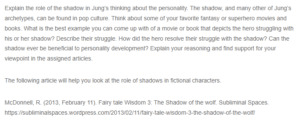The Shadow Knows
Jung attests that the shadow is the personality’s unknown dark side. Jung posits that the shadow is exposed to a psychological projection by being irrational and instinctive, where perceived inferiority is seen as a moral deficiency (McDonnel, 2013). The shadow is seen as a dark element since it has negative behaviors and emotions, which a person chooses to suppress to prevent societal judgment. Hire our assignment writing services in case your assignment is devastating you. Our team of experts is ready to help.
In the book ‘A Wizard of Earthsea’ by Ursula K. Le Guin, protagonist Ged meets his shadow for the first time and has a horrible experience, especially as a child (Le Guin, 2012). His shadow is shown because he performs a dark spell, which exposes his weaknesses in physical form. The weakness exposed as his shadow was his disobedience since he disobeyed his master Ogion and cast a spell.
Ged resolved his struggle with the shadow through light meeting darkness. In his last encounter with the shadow, he realizes that the actual name of the shadow is his own. Ursula writes that Ged spoke the name of the shadow, and at the same time, the shadow spoke back without movement of the tongue or lips, saying the word ‘Ged.’ This is where the two voices were merged into one. Ged then declares that it is done, that it is over, that his wound is healed, and that he is free and whole (Le Guin, 2012). This means that the shadow is the dark part of Ged, and by accepting it as his part, he could absorb it.
As seen, Jung argues that the shadow is the ark complement of the expressed personality that lies in the conscious part of a person (McDonnel, 2013). Daniels (2021) states that when people repress, the ego pushes the unacceptable trends into the unconscious, where they remain shameful personal secrets. He adds that repression needs psychic energy and can harm an individual due to the overall depletion of their reserves of psychology. This repression can also harm individuals because the shadow may have unexpressed and unacknowledged beneficial and positive characteristics like the capacity for creativity, love, and joy. Therefore, the shadow, in this case, can benefit personality development.
References
Daniels, M. (2021). Shadow, Self, Spirit-Revised Edition: Essays in Transpersonal Psychology. Exeter: Andrews UK Limited.
Le Guin, U. K. (2012). A Wizard of Earthsea. Houghton Mifflin Harcourt.
McDonnell, R. (2013). Fairy Tale Wisdom 3: The Shadow of the Wolf. https://subliminalspaces.wordpress.com/2013/02/11/fairy-tale-wisdom-3-the-shadow-of-the-wolf/
ORDER A PLAGIARISM-FREE PAPER HERE
We’ll write everything from scratch
Question
Explain the role of the shadow in Jung’s thinking about the personality. The shadow, and many other of Jung’s archetypes, can be found in pop culture. Think about some of your favorite fantasy or superhero movies and books. What is the best example you can come up with of a film or book that depicts the hero struggling with their shadow? Describe their struggle. How did the hero resolve their battle with the shadow? Can the shadow ever be beneficial to personality development? Explain your reasoning and find support for your viewpoint in the assigned articles.

The Shadow Knows
The following article will help you look at the role of shadows in fictional characters.
McDonnell, R. (2013, February 11). Fairy tale Wisdom 3: The Shadow of the wolf. Subliminal Spaces. https://subliminalspaces.wordpress.com/2013/02/11/fairy-tale-wisdom-3-the-shadow-of-the-wolf/

